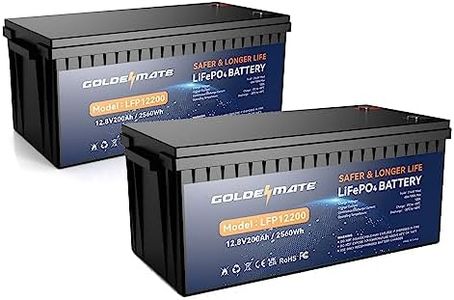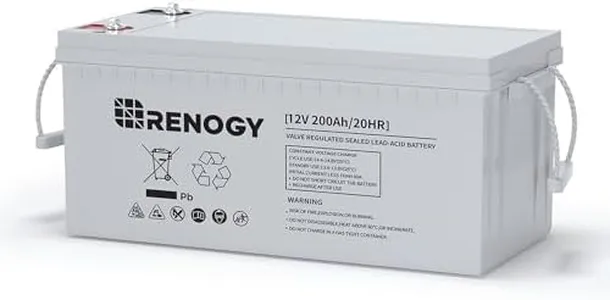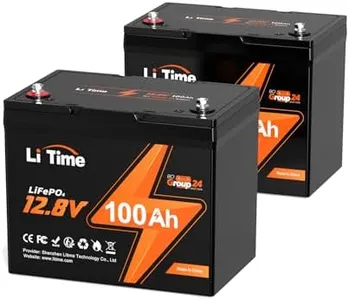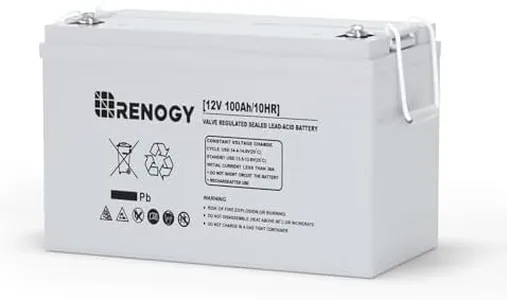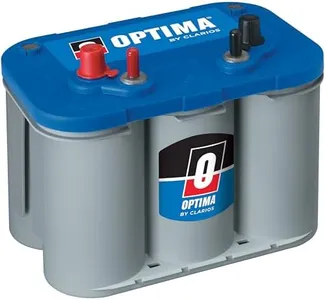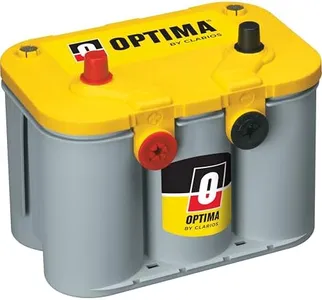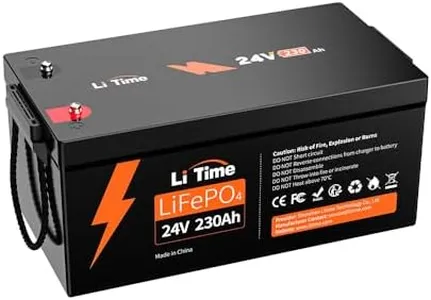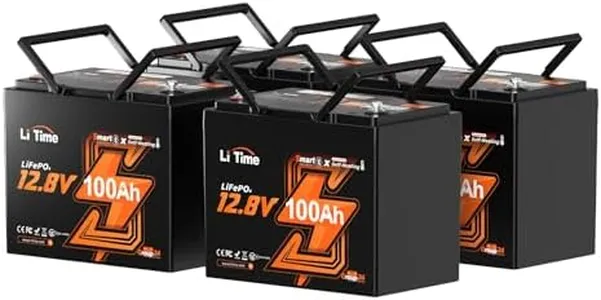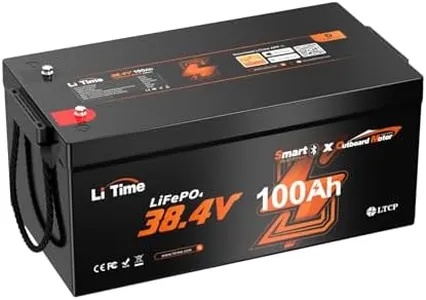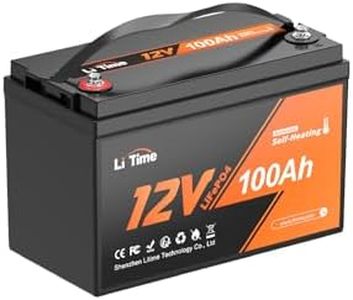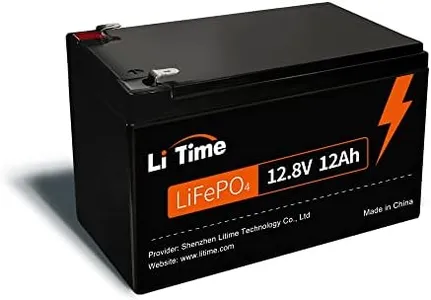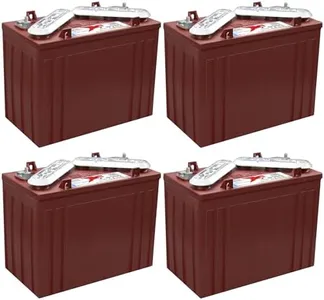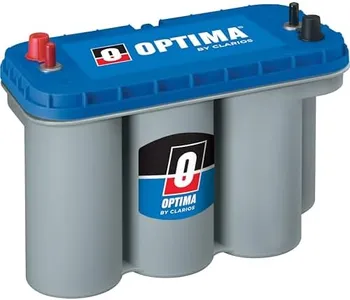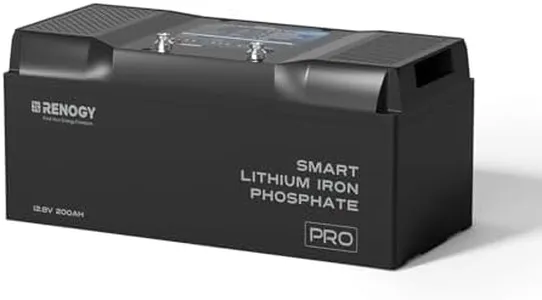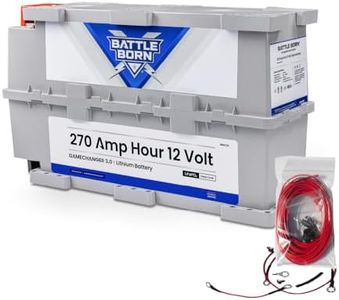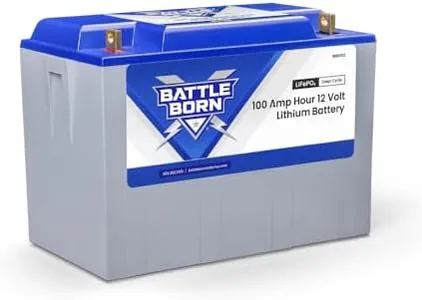10 Best Rv House Batteries 2025 in the United States
Our technology thoroughly searches through the online shopping world, reviewing hundreds of sites. We then process and analyze this information, updating in real-time to bring you the latest top-rated products. This way, you always get the best and most current options available.

Our Top Picks
Winner
Renogy Deep Cycle AGM Battery 12 Volt 200Ah, 3% Self-Discharge Rate, 2000A Max Discharge Current, Safe Charge Most Home Appliances for RV, Camping, Cabin, Marine and Off-Grid System, Maintenance-Free
Most important from
1035 reviews
The Renogy Deep Cycle AGM Battery offers a robust option for those looking for a reliable power source for RVs, camping, and off-grid systems. With a capacity of 200Ah, it provides ample power storage, making it suitable for extended use without frequent recharging. The battery operates at 12 volts, which is standard for most RV applications, ensuring compatibility with typical systems.
One of its notable advantages is the low self-discharge rate of just 3%, allowing the battery to hold its charge longer when not in use compared to many flooded alternatives. Additionally, the AGM (Absorbent Glass Mat) technology means it's maintenance-free, eliminating concerns about acid leakage or the need for regular upkeep. This feature is particularly appealing for those who prefer a hassle-free experience.
The battery's ability to handle high discharge currents—up to 2000A—means it can safely power a variety of home appliances, which is ideal for RV users who may need to run multiple devices simultaneously. Its wide operating temperature range ensures reliability in various environmental conditions, notably performing well even in cold climates. However, at nearly 128 pounds, the battery is quite heavy, which could be a consideration for those with weight constraints or limited installation space. Its dimensions (20.5 x 9.4 x 8.8 inches) require sufficient space for installation, so it's essential to ensure compatibility with your RV setup. While the battery is durable and versatile, users should note the importance of installing it upright to avoid any potential issues, although side installation is permissible in certain situations.
The Renogy Deep Cycle AGM Battery is a solid choice for those needing a powerful and low-maintenance battery solution, especially for RVs and off-grid settings. Its high capacity, low self-discharge rate, and maintenance-free nature make it a convenient and efficient power source for long-term use.
Most important from
1035 reviews
LiTime 2 Pack 12V 100Ah RV Lithium Battery, Group 24 Rechargeable LiFePO4 Battery with Up to 15000 Cycles, 1.28kWh and Higher Energy Density, Perfect for Trolling Motors, Boat, Marine, Solar etc.
Most important from
189 reviews
The LiTime 2 Pack 12V 100Ah RV Lithium Battery is a solid choice for those looking for reliable power solutions for RVs, boats, and solar systems. One of its standout features is its impressive cycle life, boasting over 4,000 cycles and a 10-year service life, which translates to long-term savings and reduced replacement frequency. At 21 pounds, it's lighter than traditional AGM batteries, making it easier to handle and install. Its higher energy density means it offers more power in a smaller size, which is a huge plus for anyone needing space optimization in their setup.
The universal fit of the Group 24 size allows for easy replacement of existing batteries without complex wiring or additional modifications. Users looking to expand their energy storage will appreciate the ability to connect multiple units, expanding from 1.28kWh to a maximum of 20.48kWh, providing flexibility for diverse power needs.
While the battery is designed with advanced safety features, it does require care in handling, particularly due to its weight and packaging upon delivery. Additionally, it’s worth noting that this battery isn't meant for starting engines or use in golf carts, which could limit its versatility for some users. Furthermore, the initial investment might be higher than traditional lead-acid batteries, but this cost is offset by its longevity and performance benefits.
Most important from
189 reviews
Renogy Deep Cycle AGM 12 Volt 100Ah Battery, 3% Self-Discharge Rate, 1100A Max Discharge Current, Safe Charge Appliances for RV, Camping, Cabin, Marine and Off-Grid System, Maintenance-Free
Most important from
2031 reviews
The Renogy Deep Cycle AGM 12 Volt 100Ah Battery is a solid choice for those needing reliable power for RV, camping, or off-grid systems. This battery uses AGM (Absorbent Glass Mat) technology, which is known for its safety and stability. It's designed to handle a variety of home appliances and has a high discharge current of up to 1100A for short bursts, making it versatile for different power needs.
With a capacity of 100Ah and a voltage of 12V, it offers ample power storage, suitable for extended use on trips or in remote locations. One of its standout features is its performance in extreme temperatures, operating effectively from -4 to 140°F (-20 to 60°C), which is a significant advantage for users in varied climates. Additionally, it has a very low self-discharge rate of 3%, meaning it can hold a charge for long periods without needing frequent recharges, and it's maintenance-free, adding to its convenience.
However, at 63.9 pounds, it is relatively heavy, which might be a drawback for some users when it comes to installation and portability. Also, while it supports series and parallel connections, it's limited to just up to 4 parallel connections, which may restrict its scalability for larger setups. Despite these minor drawbacks, the Renogy Deep Cycle AGM battery is highly reliable, well-reviewed, and trusted by many users around the world.
